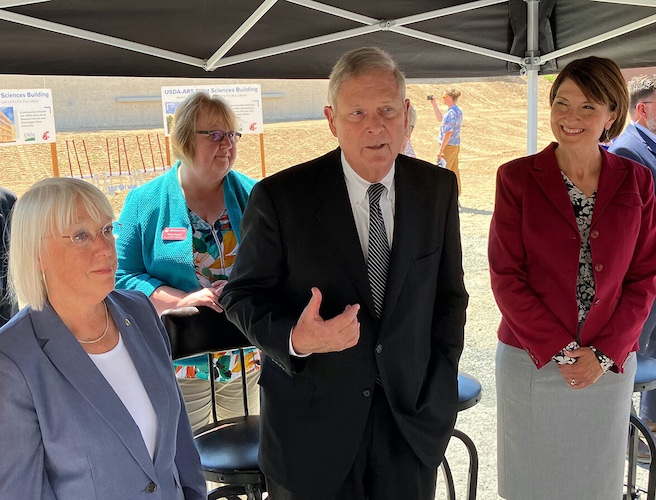forum
library
tutorial
contact

PNWA: Federal Negotiations Reaffirmed
Congressional Authority Over Snake River Dams
by Matthew Weaver
Capital Press, September 30, 2024
|
the film forum library tutorial contact |

|
PNWA: Federal Negotiations Reaffirmed
by Matthew Weaver
|
"This is a war of attrition, and we are winning, but we need to keep fighting."
-- Anthony Pena, government relations for Pacific Northwest Waterways Association
 Federal commitments made to Northwest Tribes and the states of Oregon and Washington assume the lower Snake River dams will eventually be breached, but they also acknowledge that only Congress can make that decision.
Federal commitments made to Northwest Tribes and the states of Oregon and Washington assume the lower Snake River dams will eventually be breached, but they also acknowledge that only Congress can make that decision.
Inclusion of that fact is significant, said Anthony Pena, government relations manager for the Pacific Northwest Waterways Association, in an update to Washington Grain Commission board members Sept. 24.
"We had (the White House Council on Environmental Quality), and also some other folks in some of the other agencies that aren't necessarily friendly to us on this, really push the administration for over two years to get them to basically come to the table and say, 'Oh, no, we can do an executive order or, 'The president does have the authority,'" Pena said.
"Even after all of that pushing," the Department of Justice said that only Congress can authorize the breaching of the dams, Pena said. "That's something to keep in the back of our minds. That doesn't necessarily mean that's the end-all, that there's never going to be any funny business going on, because that's exactly what we're seeing going on for the next few years."
Four-step process
Dam breaching would be a four-step process through Congress, Pena said.
First, there would need to be authorization for the study of dam removal through Water Resources Development Act (WRDA), which is updated every two years.
Then, Congress would have to approve funding for the study through an appropriations request.
If the study were funded, it would take several years to conduct the study, Pena said.
Removal of the dams would need to be authorized during another WRDA cycle.
That would then require funding to remove the dams and mitigate any impacts created by removal.
"Ultimately, they would also open themselves up for potential litigation from industry folks who would be losing money," Pena said. "There would be a huge, extensive mitigation process and funding of that mitigation process that would need to be appropriated through Congress.
"It's a very high hurdle, it's also a very challenging hurdle for folks to get through," he said. "Ultimately, this is kind of why we're seeing a level of desperation on the other side to try to throw everything and the kitchen sink at the wall."
'War of attrition'
Stakeholders have been successful in preventing any "harmful" language in this year's WRDA, and for appropriations for 2024 and 2025, Pena said.
"This is a war of attrition, and we are winning, but we need to keep fighting," he said. "Although there are limitations and the other side is growing desperate, they are well-resourced."
Supporters of dam breaching include outdoor clothing company Patagonia with annual revenue of $209 million. Pena likened the situation to David versus Goliath.
"They've got deep pockets when they talk about the campaigns that they can run compared to some of the stuff we can do," he said. "Ultimately in that story, David did win. So just remember that. But it's not going to be easy, and no one ever said it was."
Advocating nationwide
Advocacy efforts must be improved and expanded each year, Pena said.
PNWA and partners such as the Washington Association of Wheat Growers, National Association of Wheat Growers, Northwest RiverPartners and Washington Public Ports Association are expanding their base of support and taking the conversation nationwide, Pena said.
The regional team met with industries along the Mississippi River on an industry alliance trip in the Midwest in June.
"If the other side is successful in dismantling our river system here, that is going to carry over to their river system," Pena said. "That's a really big message that's been resonating very deeply with industry out in the Mississippi: They're ready to fight and defend our system for the sake of their system.
"This is truly a national issue," he continued. "If these projects go, it's not just regional impacts we're going to see in our economy, it's national impacts we're going to see in our entire economy. That's an important message we need to keep sharing with folks, especially our decision makers in Congress."
Related Pages:
Vilsack on Snake River Dams: Ag 'Well-Represented' in Mediation by Matthew Weaver, Capital Press, 8/1/23
learn more on topics covered in the film
see the video
read the script
learn the songs
discussion forum
